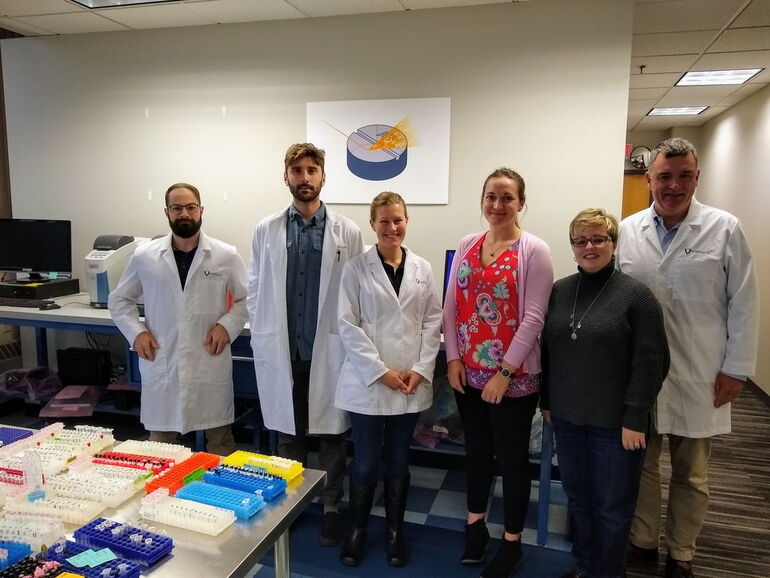Processing Your Payment
Please do not leave this page until complete. This can take a few moments.
- News
-
Editions
View Digital Editions
Biweekly Issues
- May 13, 2024
- April 29, 2024
- April 15, 2024
- April 1, 2024
- March 18, 2024
- March 4, 2024
- February 19, 2024
- February 5, 2024
- January 22, 2024
- + More
Special Editions
- Lists
- Viewpoints
- HBJ Events
- Business Calendar
- Custom Content
New pharmacy checks its meds
 PHOTO | File image by Liese Klein
Valisure staff members (l-r): Nico Zenzola, research associate; David Preli, senior research associate; Kaury Kucera, chief scientific officer; Amber Jessop, data scientist; Jessica Williston, administrative assistant, and Paul Barry, pharmacist.
PHOTO | File image by Liese Klein
Valisure staff members (l-r): Nico Zenzola, research associate; David Preli, senior research associate; Kaury Kucera, chief scientific officer; Amber Jessop, data scientist; Jessica Williston, administrative assistant, and Paul Barry, pharmacist.
When you take medication, do you know exactly what you are getting?
That’s the premise behind Valisure, a New Haven startup that launched earlier this month as the first-ever pharmacy that says it verifies each and every batch of medicine it dispenses.
Based in Science Park, the company went live with a consumer-facing website this month and started shipping to the 28 states in which it is currently licensed.
“We are the first analytical pharmacy,” said Valisure Chief Scientific Officer Kaury Kucera. “What that means is that we do quality checks of medications at the very, very end of the supply chain, before medications go to consumers.” With each prescription, clients get a certificate of analysis specifying verified dosage, inactive ingredients and other properties.
Valisure got its start in 2015, after one if its founders, Adam Clark-Joseph, had a frightening experience with a seizure medication. He found that his medication’s effects changed from prescription to prescription due to minute variations in the amount of the active ingredient in each batch. Clark-Joseph’s doctor had some frustrating advice: “Try another pharmacy.”
“This story we heard over and over again, especially when a medication goes generic,” Kucera said. “People will be on a maintenance drug — for thyroid medication, for example. Then it goes generic and they experience problems they never had before.” Studies have found that for those with seizure disorders, the act of switching pharmacies is correlated with doubling the chance of seizures, she added.
Drugs, especially generics, are frequently manufactured overseas to minimize costs, and ingredients can be adulterated or mishandled in the process. “Often there are five or six stops along the way,” Kucera said. Testing is performed at the point of manufacture, but the active ingredient in medications can vary widely in from batch to batch. “Not all drugs are spot-checked very well and there are rising concerns about counterfeit medications and generic medications that just aren’t good,” she said.
Valisure’s founders set up an analytical laboratory — the same testing done by the FDA — as part of their pharmacy. They buy a batch of medication and test samples from each batch prior to filling prescriptions for customers. Every time they order a new batch, they test anew.
“We have done it at the end of the huge, worldwide, billion-dollar supply chain,” Kucera said. A significant portion of the medication that Valisure scientists test does not pass validation, she added. Testing is done with standard equipment along with Valisure’s proprietary laser-based technology that analyzes the chemical properties and ingredients in medications.
Valisure founder and CEO David Light approached pharmacy chains and major health systems about using his technology, but they balked at the cost, Kucera said. She emphasized that prescriptions bought by individuals through Valisure don’t cost more, except when the company must purchase a higher-quality batch to meet their standards. Often the least-expensive batches purchased for testing fail validation, Kucera said.
Valisure’s ultimate goal is to see its “validated” mark become standard for those seeking quality medications. The pharmacy currently stocks about 50 of the most widely used prescription medications plus over-the-counter drugs like aspirin and ibuprofen and supplements like vitamin D. All orders are taken online and shipped to customers directly.
Now that it has launched its interface, Valisure is expanding its testing facilities in 5 Science Park and hiring another employee to add to its staff of eight, Kucera said. Next month, a direct physician interface will be added to the website. Goals include acquiring more licenses to operate in other states and ramping up marketing efforts.
“We’re hoping when people know about us, they’ll use us,” Kucera said. “If this company fails, it’s because people don’t care about the quality of their medications.”

2022 Giving Guide
This special edition informs and connects businesses with nonprofit organizations that are aligned with what they care about. Each nonprofit profile provides a crisp snapshot of the organization’s mission, goals, area of service, giving and volunteer opportunities and board leadership.
Learn more
Subscribe
Hartford Business Journal provides the top coverage of news, trends, data, politics and personalities of the area’s business community. Get the news and information you need from the award-winning writers at HBJ. Don’t miss out - subscribe today.
Subscribe
2024 Book of Lists
Delivering Vital Marketplace Content and Context to Senior Decision Makers Throughout Greater Hartford and the State ... All Year Long!
Read Here-
2022 Giving Guide
This special edition informs and connects businesses with nonprofit organizations that are aligned with what they care about. Each nonprofit profile provides a crisp snapshot of the organization’s mission, goals, area of service, giving and volunteer opportunities and board leadership.
-
Subscribe
Hartford Business Journal provides the top coverage of news, trends, data, politics and personalities of the area’s business community. Get the news and information you need from the award-winning writers at HBJ. Don’t miss out - subscribe today.
-
2024 Book of Lists
Delivering Vital Marketplace Content and Context to Senior Decision Makers Throughout Greater Hartford and the State ... All Year Long!
ABOUT
ADVERTISE
NEW ENGLAND BUSINESS MEDIA SITES
No articles left
Get access now
In order to use this feature, we need some information from you. You can also login or register for a free account.
By clicking submit you are agreeing to our cookie usage and Privacy Policy
Already have an account? Login
Already have an account? Login
Want to create an account? Register
Get access now
In order to use this feature, we need some information from you. You can also login or register for a free account.
By clicking submit you are agreeing to our cookie usage and Privacy Policy
Already have an account? Login
Already have an account? Login
Want to create an account? Register






0 Comments